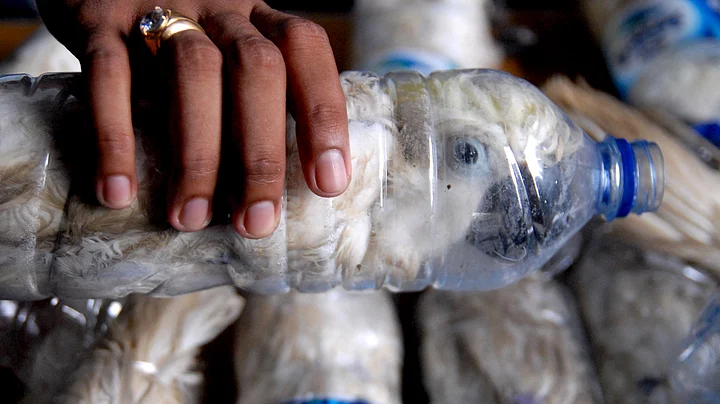Animal and bird trafficking are on an upward spiral. Conservationists say wildlife trafficking is reaching unprecedented levels. The illegal wildlife trade is estimated to be $8 billion a year worldwide, according to TRAFFIC, a wildlife trade monitoring network.
The Quint brings you a series of recent pictures of some endangered species, including animals and birds that were rescued by security agencies worldwide while being trafficked.
Fresh Water Crocodiles
A type of freshwater crocodile which are trafficked from India and Bangladesh into Thailand. One single baby crocodile is sold for 10,000 Baht each (Rs 19,000).
Pangolin
The numbers are astounding. By the most conservative estimates, 10,000 pangolins are trafficked illegally each year. Only 10% to 20% of the actual trade is reported by the news media – although the true number trafficked between 2012 and 2014 was 116,990 to 233,980, according to Annamiticus, a US-based non-profit.
It is believed that its meat and blood can enhance sexual virility and hence it is the most trafficked mammal in the world.
The Thai custom office showed 175 pangolins they found hidden in a truck heading into Bangkok. Pangolins, or Manis Javanica, listed as endangered species in CITES (Convention on International Trade in Endangered Species), are found in Southeast Asia.
Greece Wolf Skin
A total of 645 wolf skins were concealed in bags that were labelled ‘fur scraps’. It is not clear if the skins are from Greece’s indigenous wolf population, which is estimated to number 500-700 animals.
According to Chinese media, the goods were packed into 30 sacks, each of which was labelled “fur scraps”. The accompanying documentation stated that the total weight of the freight was 1,400kg and was valued at $3,700 (Rs 2.3 lakh).
Malayan Sun Bear
The Malayan Sun bears are estimated to be worth $20,000 (Rs 12.8 lakh) each in the black market. This is an endangered species and is sold in high value across Southeast Asia and parts of South America.
The Malayan wildlife department recently seized a large number of Sun bears during an operation against illegal wildlife traders in May.
Green Turtle
A total of approximately 1,960 turtles had been seized in 22 raids between January 2008 and March 2015 just from the black market in Karachi, Pakistan. According to WWF, Pakistan has a huge market for illegal ‘Green Turtle’ trade.
Recently, Bali too has been a hotspot for Green Turtle trafficking. The Bali Police on May 6 had foiled an attempt to smuggle 71 green turtles for food. The turtles were caught in the waters off Sulawesi Island.
Spider Monkey
According to Mexico’s Federal Wildlife Conservation Department, at least 2,500 different animals are rescued annually in the country, 70% from illegal animal trafficking within and outside the country and 30% from domestic captivity.
Long-tailed Macaque
In the last 30 years, this unique primate species has seen its population in Morocco and Algeria dwindle from approximately 23,000 to an estimated 8,000 approximately.
The largest wild sub-population, which inhabits the mixed cedar forests of the Middle Atlas mountains in Morocco, has been decimated; only 5,000 remain, a 65% decrease in just three decades.
Hunan Police have recently arrested 11 people trying to smuggle at least 100 long-tailed macaques, which is a second grade protected species in China.
African Grey Parrots
Illegal trade in the parrots, which are valued between $300 (Rs 19,000) and $700 (Rs 45,000) in the black market has increased in recent years, according to Convention on International Trade in Endangered Species (CITES).
African grey parrots are mostly exported from Cameroon and Congo.
CITES has directed both Cameroon and Congo to suspend all trade in these bird species as they are going extinct.
(At The Quint, we question everything. Play an active role in shaping our journalism by becoming a member today.)
